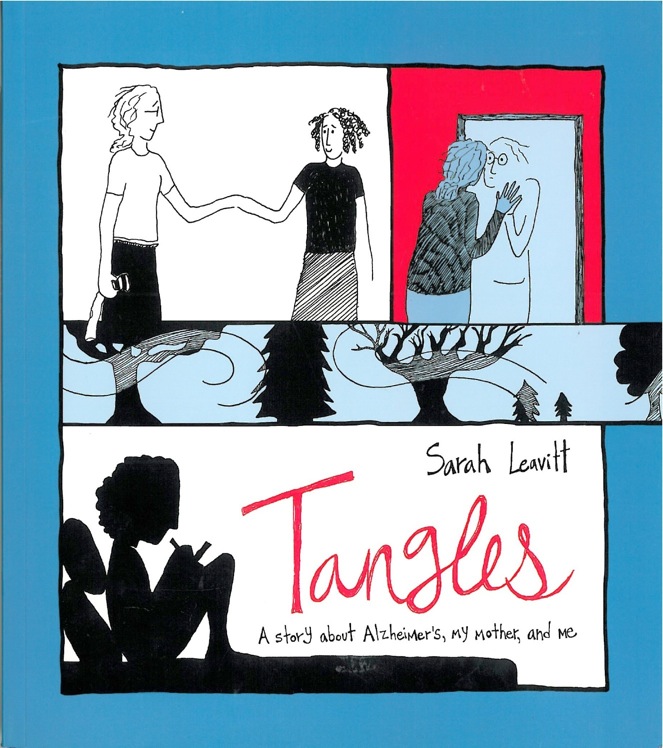
On Monday, Nov. 5 Sarah Leavitt came to the Puget Sound campus to discuss her book Tangles, a story told in comics about her experience with her mother’s Alzheimer’s disease.
The Canadian writer, invited by Professor Mita Mahato, talked about the significance of the medium of comics and read a few pages from Tangles, explaining her process of writing and drawing it.
To begin, Leavitt presented many perspectives as to what the definition of ‘a comic’ was.
“Many people, when they think of comics,” Leavitt said, “they think traditionally of Superman or Archie comics.”
Of course, Leavitt’s Tangles isn’t exactly a superhero story, and there is definitely a broader spectrum of comics than those portraying comedy or super-powered fighters of evil.
Leavitt showed a quote by Will Eisner from his book Comics and Sequential Art, in which he defined comics as “the arrangement of pictures or images and words to narrate a story or dramatize an idea.”
Another quote, from Scott McCloud’s Understanding Comics, defined this medium as “juxtaposed pictorial and other images in deliberate sequence, intended to convey information and/or to produce an aesthetic response in the viewer.”
Yet another definition comes from Robert C. Harvey’s How Comics Came to Be. “For [Harvey], it’s really the blending of the words and images” that defines a comic, Leavitt explained
Apparently, comics are difficult to define even by those who write and draw them, so it’s no wonder we want to lump all comics in the categories of superheroes and Archie.
The last quote Leavitt showed came from Understanding Comics, in which McCloud said that “however much we may try to understand the world of comics around us, a part of that world will always lie in shadow—a mystery.”
Leavitt also talked about some comics that, like hers, are autobiographical. For example, Lynda Barry’s ONE! HUNDRED! DEMONS! tells stories about the so-called “demons” Barry has had to wrestle with in her life.
Art Spiegelman’s Maus is also an autobiography, although it is drawn much differently than ONE! HUNDRED! DEMONS! is.
Maus tells the story of his father’s experience during the Holocaust, and uses various animals to represent different kinds of people: the Jews are mice, the Germans are cats, the Americans are dogs and the Poles are pigs.
Other comic autobiographies that Leavitt mentioned were Special Exits by Joyce Farmer and Cancer Made Me a Shallower Person by Miriam Engelberg.
Leavitt’s own autobiography, Tangles, deals with a topic that is very personal and somber and yet, through the comic medium, she manages to make it relatable.
“Even though it is personal, it invites readers in,” Mahato said of the book.
The writing process began for Leavitt long before she had decided to make her mother’s story into a comic.
“It took me four years,” Leavitt said.
“I started writing notes and making sketches when my mom got sick,” she said, some of which Leavitt showed the audience during her presentation. “I took notes on the weird things my mom said, so that I wouldn’t revise them in my head later.
“I included the times when we laughed,” she said, which may be part of the reason why readers find Tangles easy to identify with.
When asked about why she chose to make the story a comic, Leavitt wasn’t sure.
“I was kind of figuring out when I was writing it,” she said.
As a child, she often drew. “I would make little books for my parents,” she said.
When she began reading other comics by other writers and artists, she aspired to make her own.
“I could do comics, even though I’m not a teenage boy,” she realized.
Tangles, as Leavitt explained, is as much a testament to her mother’s illness as it is a story of experiencing it for herself.
“My main reason for wanting to write [Tangles] was to remember my mom,” Leavitt said.
“I feel like it’s important to have an artistic expression about Alzheimer’s,” she continued. “This weird and horrible thing happened to me, and I wanted to tell what it was like.”
Leavitt certainly tells it well. Tangles is both heartbreaking and witty, and through simplistic yet powerful prose and drawings, Leavitt conveys very well all the emotions and aspects of her mother’s struggle with Alzheimer’s well enough that anyone reading it can identify with her experience.
For more information on Sarah Leavitt and her work, please visit www.sarahleavitt.com
COVER COURTESY / BROADVIEW PRESS
